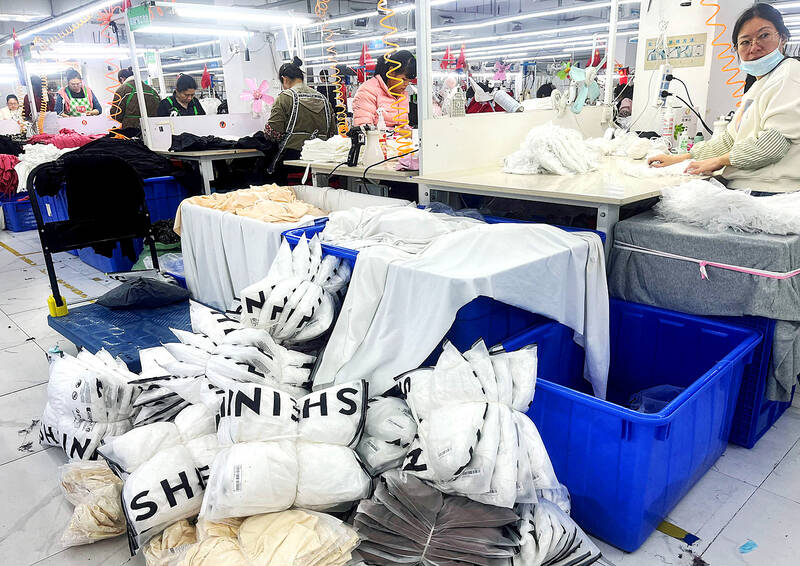The US is to cut the low value de minimis tariff on China shipments, a White House executive order said on Monday, further de-escalating a potentially damaging trade war between the world’s two largest economies.
The tariff relief comes in the wake of Beijing and Washington announcing a truce in their trade spat after weekend talks in Geneva, Switzerland, with both sides agreeing to unwind most of the tariffs imposed on each other’s goods since early last month.
The Geneva agreement slashed tariffs for the US and China by 115 percentage points each, to 10 percent and 30 percent respectively, for at least 90 days.

Photo: Reuters
While their joint statement in Geneva did not mention the de minimis duties, the White House order released later said the levies would be reduced to 54 percent from 120 percent, with a flat fee of US$100 to remain, starting from today.
De minimis — a legal term referring to matters of little importance, which describes the US waiver of standard customs procedures and tariffs — was one of the most generous exemptions in the world: For example, the EU de minimis threshold is 150 euros (US$167).
The de minimis exemption, for items valued at up to US$800 and sent from China through postal services, were previously able to enter the US duty free and with minimal inspections.
In February, US President Donald Trump ended the de minimis exemption by imposing a tax of 120 percent of the package’s value or a planned flat fee of US$200 — set to come into effect by next month — blaming it for being heavily used by companies such as Shein (希音), Temu and other e-commerce firms, as well as traffickers of fentanyl and other illicit goods.
The number of shipments entering the US through the tax-free channel exploded in the past few years with more than 90 percent of all packages coming via de minimis. Of those, about 60 percent came from China, led by direct-to-consumer retailers such as Temu and Shein.
In Monday’s order, the White House said the reduced tariffs were to take effect by 12:01am today.
The plan for a US$200 flat fee duty rate would also be shelved, it said, keeping it at US$100.
China exported US$240 billion in direct-to-consumer goods benefiting from de minimis worldwide last year, accounting for 7 percent of its overseas sales and contributing 1.3 percent of GDP, Nomura Holdings Inc’s estimates showed.
Separately, China has removed a ban on airlines taking delivery of Boeing Co planes in the wake of the Geneva trade deal, Bloomberg News reported yesterday, citing sources familiar with the matter.
Officials in Beijing have started to tell domestic carriers and government agencies this week that deliveries of aircraft made in the US can resume, Bloomberg said.
While the lifting of the ban clears the way for deliveries to restart, it is unclear how soon China’s carriers can get the planes they need, and the restoration of jet deliveries could be short-lived if the tariff war is not resolved during the three-month reprieve.

When Lika Megreladze was a child, life in her native western Georgian region of Guria revolved around tea. Her mother worked for decades as a scientist at the Soviet Union’s Institute of Tea and Subtropical Crops in the village of Anaseuli, Georgia, perfecting cultivation methods for a Georgian tea industry that supplied the bulk of the vast communist state’s brews. “When I was a child, this was only my mum’s workplace. Only later I realized that it was something big,” she said. Now, the institute lies abandoned. Yellowed papers are strewn around its decaying corridors, and a statue of Soviet founder Vladimir Lenin

UNCERTAINTIES: Exports surged 34.1% and private investment grew 7.03% to outpace expectations in the first half, although US tariffs could stall momentum The Chung-Hua Institution for Economic Research (CIER, 中華經濟研究院) yesterday raised its GDP growth forecast to 3.05 percent this year on a robust first-half performance, but warned that US tariff threats and external uncertainty could stall momentum in the second half of the year. “The first half proved exceptionally strong, allowing room for optimism,” CIER president Lien Hsien-ming (連賢明) said. “But the growth momentum may slow moving forward due to US tariffs.” The tariff threat poses definite downside risks, although the scale of the impact remains unclear given the unpredictability of US President Donald Trump’s policies, Lien said. Despite the headwinds, Taiwan is likely

UNIFYING OPPOSITION: Numerous companies have registered complaints over the potential levies, bringing together rival automakers in voicing their reservations US President Donald Trump is readying plans for industry-specific tariffs to kick in alongside his country-by-country duties in two weeks, ramping up his push to reshape the US’ standing in the global trading system by penalizing purchases from abroad. Administration officials could release details of Trump’s planned 50 percent duty on copper in the days before they are set to take effect on Friday next week, a person familiar with the matter said. That is the same date Trump’s “reciprocal” levies on products from more than 100 nations are slated to begin. Trump on Tuesday said that he is likely to impose tariffs

HELPING HAND: Approving the sale of H20s could give China the edge it needs to capture market share and become the global standard, a US representative said The US President Donald Trump administration’s decision allowing Nvidia Corp to resume shipments of its H20 artificial intelligence (AI) chips to China risks bolstering Beijing’s military capabilities and expanding its capacity to compete with the US, the head of the US House Select Committee on Strategic Competition Between the United States and the Chinese Communist Party said. “The H20, which is a cost-effective and powerful AI inference chip, far surpasses China’s indigenous capability and would therefore provide a substantial increase to China’s AI development,” committee chairman John Moolenaar, a Michigan Republican, said on Friday in a letter to US Secretary of